by Brian Hioe
語言:
English /// 中文
Photo credit: 映心地下放送局/Facebook
Translator: Brian Hioe
On October 24th, New Bloom editor Brian Hioe interviewed Radical Party candidate Wang Ying-xin, who is running in the Shilin-Beitou area of Taipei. This is part of New Bloom’s ongoing series of interviews with independent city councilor candidates, as part of its special 2018 election coverage.
Brian Hioe: Could you first introduce yourself for readers who may not know you?
Wang Ying-xin: My name is Wang Ying-xin. I was originally a service industry worker. I’ve done a lot of jobs, including collecting tickets at the movie theater, in a supermarket, working as a store clerk in a clothing store. These were all in the service industry. I spent about ten years doing this. I didn’t concern myself with political issues too much, primarily because of work. Now I am on the Taipei council for the Radical Party and am running for city councilor in Taipei.
BH: Why did you decide to run as a candidate?
WY: I would decide to run as a candidate is because of what I said earlier. I did not concern myself too much with Taiwanese political issues in the past. I felt that politics was dirty and that it was better just to keep fed and happy. What led me to change was the Sunflower Movement in 2014.
I didn’t deeply participate in the Sunflower Movement, but because of this movement, much more information began to appear on the Internet and from then on, I started to become conscious about Taiwanese independence and nation-building. With this rise in Taiwanese consciousness, I became more concerned with political matters.
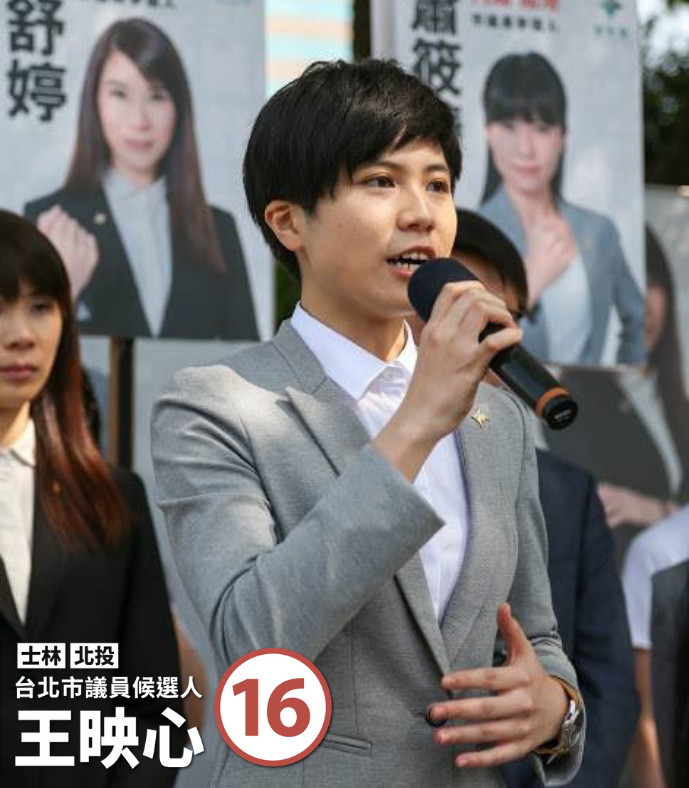 Photo credit: 映心地下放送局/Facebook
Photo credit: 映心地下放送局/Facebook
In 2016, for presidential elections and legislative elections, Radical Party chair Shinichi Chen ran in cooperation with the TSU. At that time, the Radical Party was still called Radical Wings. At the time, because I saw a campaign ad for them, in which he described Chinese infiltration efforts in Taiwan. At the time, nobody else was talking about this issue, so I decided that I thought that he was someone who knew what he was talking about and the issues that Taiwan was facing. I also decided that I wanted to get to know this political party, the Radical Party.
After I got to know this political party, I came to feel that the core values of this party we very good. Our three big policy points are political democratization, self-rule, and social liberalization. Our values focus on the individual, and this is the hope of the Radical Party, to be able to build a base from which to push for these values and to push for the equality that we hope for.
BH: Why did you decide to run for office?
WY: My background is very grassroots. I’m not a second-generation politician, nor do I come from a wealthy background. My family members have never participated in political movements. Before the Sunflower Movement, I focused on making money. Our generation as a whole faces issues of low salaries.
After high school, I worked and studied at the same time. In 2008, when Ma Ying-Jeou took power, he set Taiwanese workers down the path of low salaries with the 22 K minimum wage policy, and sought to make Taiwan economically reliant on China. For us grassroots workers, we must confront social conditions under conditions of low salaries. If we want lives less restrictive of workers, we have to confront these economic issues, including issues of low salaries and overwork, and conditions which lead Taiwanese overseas in search of work and higher salaries.
I originally thought about this as well before the Sunflower Movement. I thought as long as I made money, this was fine. But because of the Radical Party and because of the Sunflower Movement, I only later began to think about whether things had to be this way. And that Taiwan has a party which is not a local party at all, the Chinese KMT, and it still is allowed to exist on this island. I felt that this was not reasonable, which was I joined the Radical Party as a volunteer.
But after they watched my work for a while, chair Shinichi Chen asked me if I would consider running. I decided to do after thinking about it for a long time because while I had pursued social change, this was on the streets. However, I discovered that there is a limit to street protests. As a Taiwanese independence party, we lack resources and are blocked from the media.
BH: What do you think is particular about this area you are running in? Who are your opponents and what is your electoral strategy?
WY: Yes. In Taipei’s Election District 1, Shilin-Beitou, this is an area in which there is a large disparity in wealth. Here are some people here who are very poor and others who are extremely wealthy. Some parts of the area have a high average income, such as Tianmu. Because of the lack of distribution of resources, inequality is very high, and so we hope to provide for a social safety net after taking power, to help those who need it.
Moreover, this area has a special feature, which is that there are a lot of so-called Third Force parties in this area. While the candidates of these parties all claim to represent new politics and young people, the question is that while these parties have many slogans, in reality, they all stand with Ko Wen-Je for the sake of elections. If you know Ko Wen-Je, you know that he is an archetypical, opportunistic politician. Since he was elected, he has had many slogans, but he does not act on his promises. He said that he would provide for young people and ensure that they would have better salaries to win the youth vote.
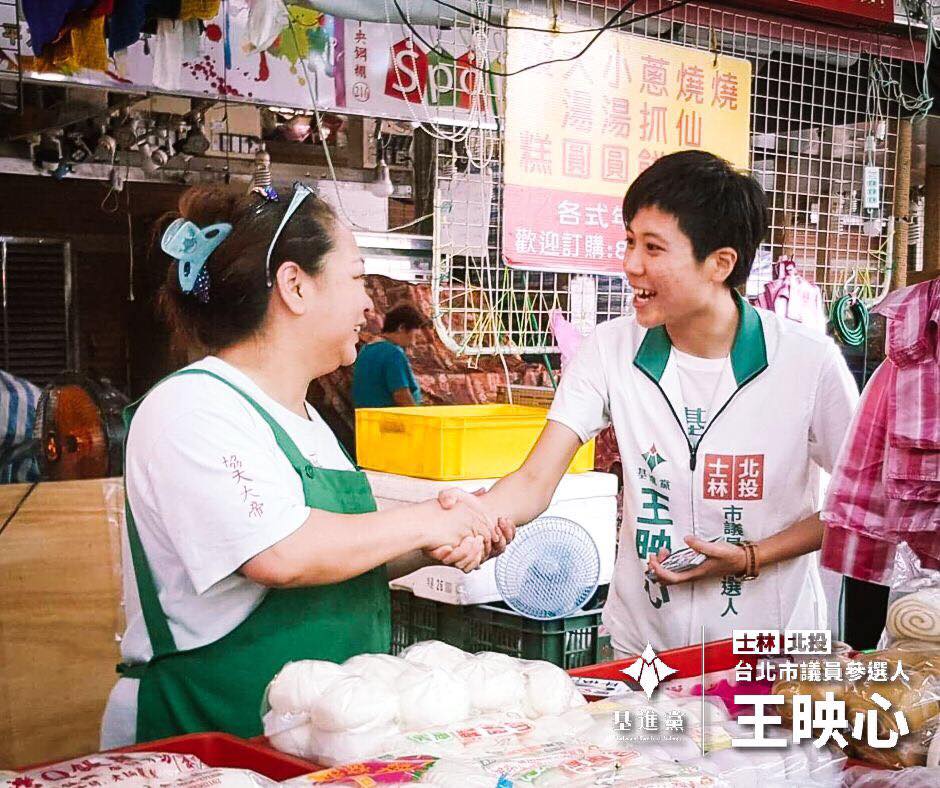 Photo credit: 映心地下放送局/Facebook
Photo credit: 映心地下放送局/Facebook
But now, he hopes to attract the votes of retired members of the military, teachers, and public servants, so now he offers money to them to make for what will be cut from their pensions. But if you think about it, this will influence us young people in favor of these people. Although he claims to be deep Green, to be the descendant of victims of political persecution, now he claims both sides of the Taiwan Straits are one family, and spouts these kinds of lives. This includes in the Universiade, that he was willing to ban the flag representing Taiwan. Fundamentally, he is a person with no core values.
If you say that you want to represent the people as a city councilor, as a city councilor, you shouldn’t try and suck up to the city mayor. He, too, is a city mayoral candidate. Otherwise, once you are elected because your relations are too good with him, you won’t provide any sort of oversight over him. Moreover, many of our city councilors, all say that their political views are to help the disprivileged in society and for the sake of equality and that these are their core values.
But as a person, Ko Wen-Je’s have nothing to do with this, these values that Third Force politicians claim to profess. He benefits conglomerates and helps China’s United Front actions directed toward Taiwan. He is not progressive at all, his values are conservative, even feudal, and patriarchal. So I don’t understand why these candidates would try to benefit by associating themselves with them. We don’t even have to raise issues of national identity, just in terms of equality.
So this area has another specificity, that there are many opportunistic politicians who fail to defend their professed values. These are my enemies, outside of the two major parties, that there are these self-proclaimed progressive Third Force parties. But their path is not so different from the DPP or KMT.
BH: What about your election strategy?
WY: Because we are a left independence party, our resources and finances are very small. We have no targeted demographic in particular for outreach except those dissatisfied with the two major political parties. Our strategy is to try and win them over, as well as those who are more local, and are dissatisfied with the DPP’s actions since it took power.
Many old pro-independence activists had strong hopes towards the DPP, seeing as it took the majority of the government for the first time in history. They hoped it could do something. But their voices were not heard. Many people proclaim that they will realize a new form of politics, as I said, but instead have followed an old path. We hope to win over those who have been disappointed in such a way. Many claim to represent new politics, but like regular politicians, you can see that they just hang billboards everywhere. We quite clearly do not wish to be like old politicians. For example, we see that others put quantity over quality in their campaigning, whereas we hope for the office.
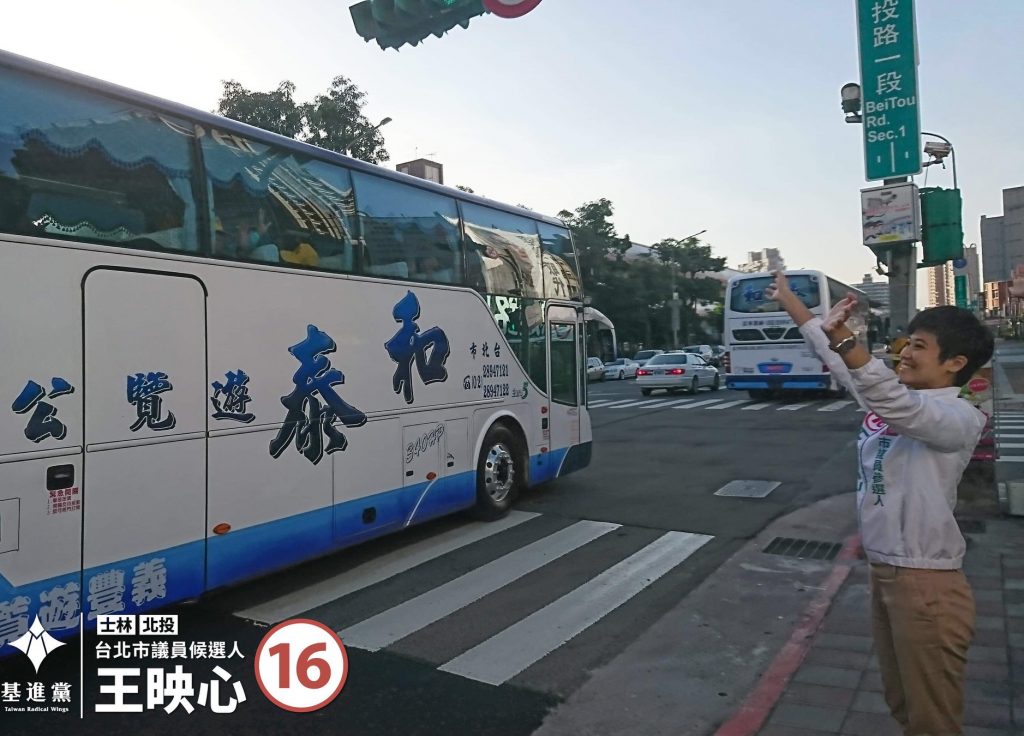 Photo credit: 映心地下放送局/Facebook
Photo credit: 映心地下放送局/Facebook
For example, a politician may hand out a lot of tissues or campaign items. But we try to shake hands with everyone we meet, to share our ideals with them, and tell them what we want to future with them. We hope to break apart these old political values, to avoid saying one thing and doing another, but to spend time doing things. For example, when we stand on a street corner, we don’t just stand there and wave to people and say, “Hello! Good morning!” We spend time speaking to them about our policies, we treat it like speaking in an auditorium, such as speaking outside, in a market, in a park, or other places.
Traditional politicians won’t spend as much time doing this because they have packed schedules. But we need to raise our visibility, so we spend time making appearances at events, canvassing, and being very meticulous in terms of what we do.
Because like I said, right now for candidates in Taipei, Ko Wen-Je draws a great deal of attention. If you stick with him, media attention will also follow, so candidates rush to be with him. This is especially bad in Shilin-Beitou, with not just smaller politicians rushing to Ko Wen-Je’s side, but also with city council candidates including Lin Rui-tu, Chen Zheng-zhong, and others. This is quite amazing.
But fundamentally, regular people are dissatisfied with Ko Wen-Je. This includes on the issue of Double Nine money but also claims by him that both sides of the Taiwan Straits are one family. Young people are also dissatisfied with campaign promises that Ko does not live up to, such as with regards to the Taipei Dome.
We are the only political party that completely opposes Ko Wen-Je. Why completely? You can see with the NPP that there are some differences between their north and their south, as well as between Taipei, and New Taipei City. In Taipei, the NPP’s candidates are very close to Ko Wen-Je, including attempting to defend his lies.
With regards to outreach, we try to return to policy in our advertisements, on our Facebook, on advertising on buses. As a political party, we emphasize our values, rather than stick to Ko Wen-Je, and criticize him for his actions.
BH: What is particular about you as a political candidate? What is different about you from other candidates?
WY: This is similar to what you asked before. We are not from political families, nor do we come from a background of wealth. We are all from the grassroots. This is not just me, but also true of other political candidates. We all come from different backgrounds and have decided to run.
I believe that we understand the needs of the people better, including with regards to their live. Because although there are many candidates from small political parties, their heads are in the clouds, and they aren’t very in touch with on the ground matters. If you see their political opinions, you can see this. If we are to be representatives of public opinion as city councilors, this is a very grassroots position. You have to understand life needs, otherwise, you can’t make changes for the people. So we have to think about, what kind of place do we want Shilin-Beitou to be in ten years, in twenty years time, for us to live in? You need to have a blueprint for the area and clear thinking about this, and a general direction.
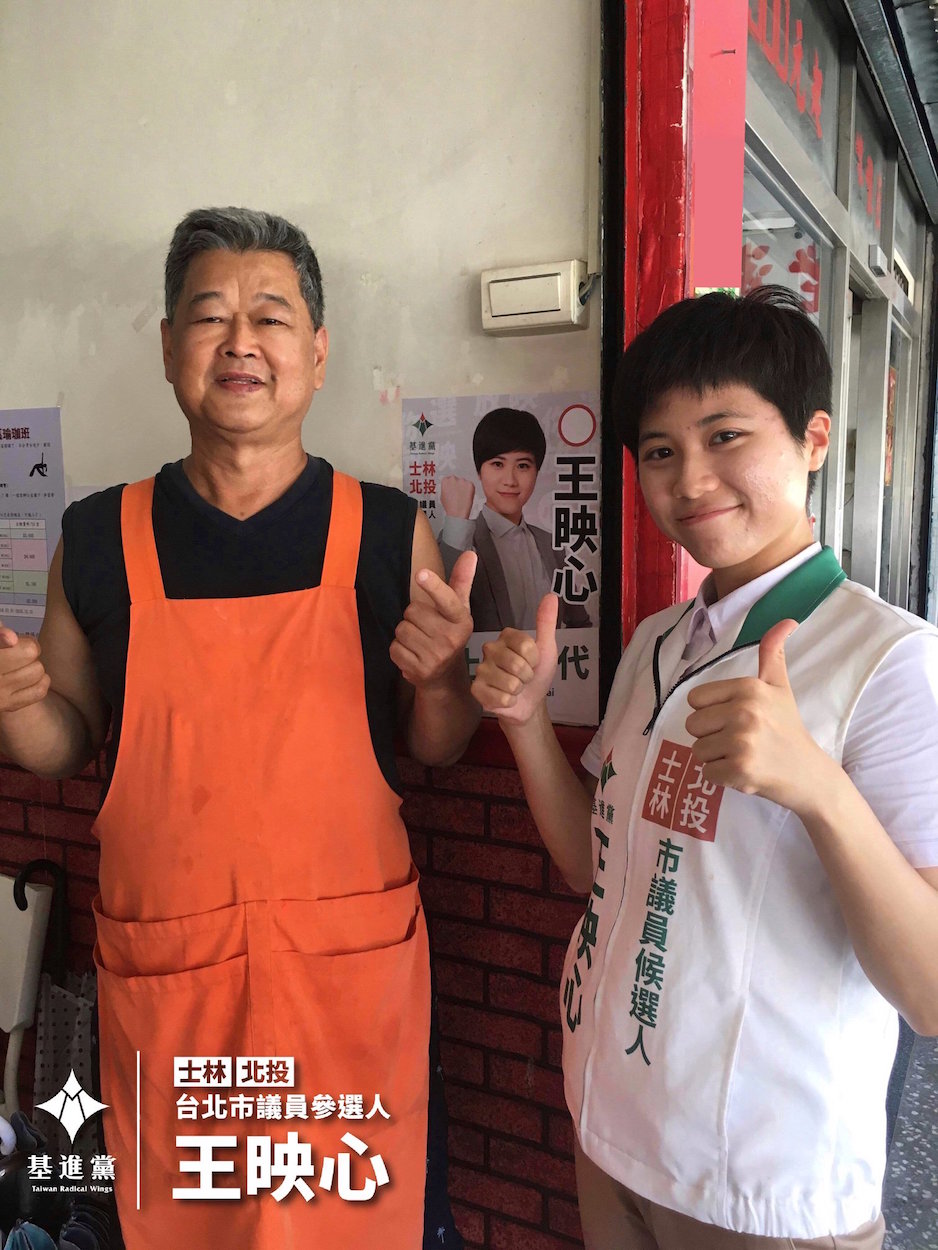 Photo credit: 映心地下放送局/Facebook
Photo credit: 映心地下放送局/Facebook
But we can see that whether with traditional politicians or Third Force politicians, that they lack this blueprint. They try to win people over through providing basic services, to take care of issues. You can see that they miss the point of thinking about the future of the area.
Why is it that Third Force and traditional politicians don’t have a blueprint for the future of the area? I think that a key reason is that they don’t have core values on the matter. You must have core values as a politician. Ko Wen-Je may abuse this phrase, but only if you have this can you up with political opinions or plans. If you want to help the regular people of Shilin and Beitou, you must have this plan. If you advocate protecting the environment, you have to think about how to make Shilin-Beitou a green city in ten years time. If you don’t have core values, I don’t know how you would come up with policy.
Another important point of having core values is that you have to think of a way to keep yourself from reaching your political expiration date. What we call reaching your political expiration date is what leads Taiwanese people to be disappointed with politics, because for many politicians, once they become elected, they start to become rotten. They start to hand out cash for votes or start to have scandals.
But these people become rotten, not because they turn into this only after being elected. They are like this in the process of being elected itself. Because they spend a lot of money on campaigning, so they must make that money back. They think that as long as they get elected, it doesn’t matter how much they spend.
So they will do anything it takes to get elected. For example, for NPP candidates, whenever they get elected, they will seek out the pro-independence camp for money. How to be different from these people, then?
If you need votes and so you stick close to Ko Wen-Je, and you discard your core values, but that is what I believe makes us from the Radical Party different. Again, we aren’t from money or political families, and we protect our core values. We won’t let ourselves become rotten like that. In order to keep from politically expiring, we are thinking about the future of the city.
BH: What kind of challenges do you have to overcome in the course of your campaign?
WY: I think that there are quite a lot of challenges. But in a word, what we confront is the old political system dependent on money and on local networks. The challenge we confront are these old politics because this has been accumulated from politics up until now. Much money is spent on elections or given to local networks. They also need local organizations to help them. They also emphasize providing local services, such as city councilors helping lizhang.
Providing services are the bottom line of what lizhang provide. City councilors should draw up plans for the future of city government. But political culture has become such that city councilors are providing the basic services that lizhang should be doing. It becomes that you have to make a lot of public appearances in front of people, that they need to see you, and they feel you are doing things. In the mid-autumn festival, you need to provide a gift, a raffle, and things like this.
 Photo credit: 映心地下放送局/Facebook
Photo credit: 映心地下放送局/Facebook
This all has to do with money and this all has to do resources. So it becomes that all of your energy is spent these things, and you don’t have the energy to do important things. For example, in the finance industry in Shilin or just industry in general, this is being infiltrated by Chinese influence. Chinese influence is encroaching into our lives. Are people concerned with this?
There is a lot of fake news. Much government resources are being sucked towards United Front activities. These importance things affect national security, but nobody talks about this. This political culture has become such that city councilors provide services to lizhang. This situation is wrong. This is my largest challenge, in confronting this.
Many people will claim to us, after hearing this, that they pick based on individual and based on political party, and that it would be better if there were no parties. Why are there so many parties in Taiwan, that I don’t know which one to pick?
I’ve said this many times, repeatedly. When you cannot shake up this political system, it becomes like this. We understand that you cannot change the system in one or two days, but you have to begin from small things and to slowly change it.
If we are voted in, we will begin from the grassroots. Because this returns to the fundamental problem, which is that too much money is spent on elections. If we are elected into power and hold power, we hope to change this. But we currently have no elected representatives. We have raised before, each candidate of ours is restricted to a budget of 1,500,000 NT as an upper limit If you want to change this election system, this is needed. We hope to share our values through speeches on the streets, starting from the grassroots. We hope to one day grow and have members in the legislature,
If we have seats in the legislature, we will raise this in our legislative proposals. Like they do in other countries, we want to set up an area in which all of the people running in an area will put up their posters, and this will be limited to only there. Voters will only have to go to the bulletin board there to see who is running in an area.
BH: Do think that the political developments of the last few years can be connected to what has happened in Taiwan with the rise of the Third Force?
WY: Actually, my views on this are a bit different from other candidates. Before I respond, I have to raise this issue that I am deeply concerned with Taiwanese media, because, in these ten years, media has been influenced very heavily China. But as you say, the influence of the international world, as with the rise of Trump, the independence referendums in Ireland or Catalonia, or Brexit.
What has Taiwanese media made of these important political developments? It’s reported a little on these events for one or two days but doesn’t report on it in the end. Including with the current trade war between America and China, and the new trend of democratic countries allying in order to block Chinese influence. But you find that Taiwanese people are lagging in their information regarding international developments.
Democratic countries have already begun to work to block Chinese influence, and have even passed laws to address this. But has Taiwan followed these international trends? After all, Taiwan most directly is influenced by China, and we are negatively influenced by China more than other countries. But Taiwanese have not raised this in the legislature or other contexts. This kind of policy to defend against China is under-discussed in Taiwanese media and society.
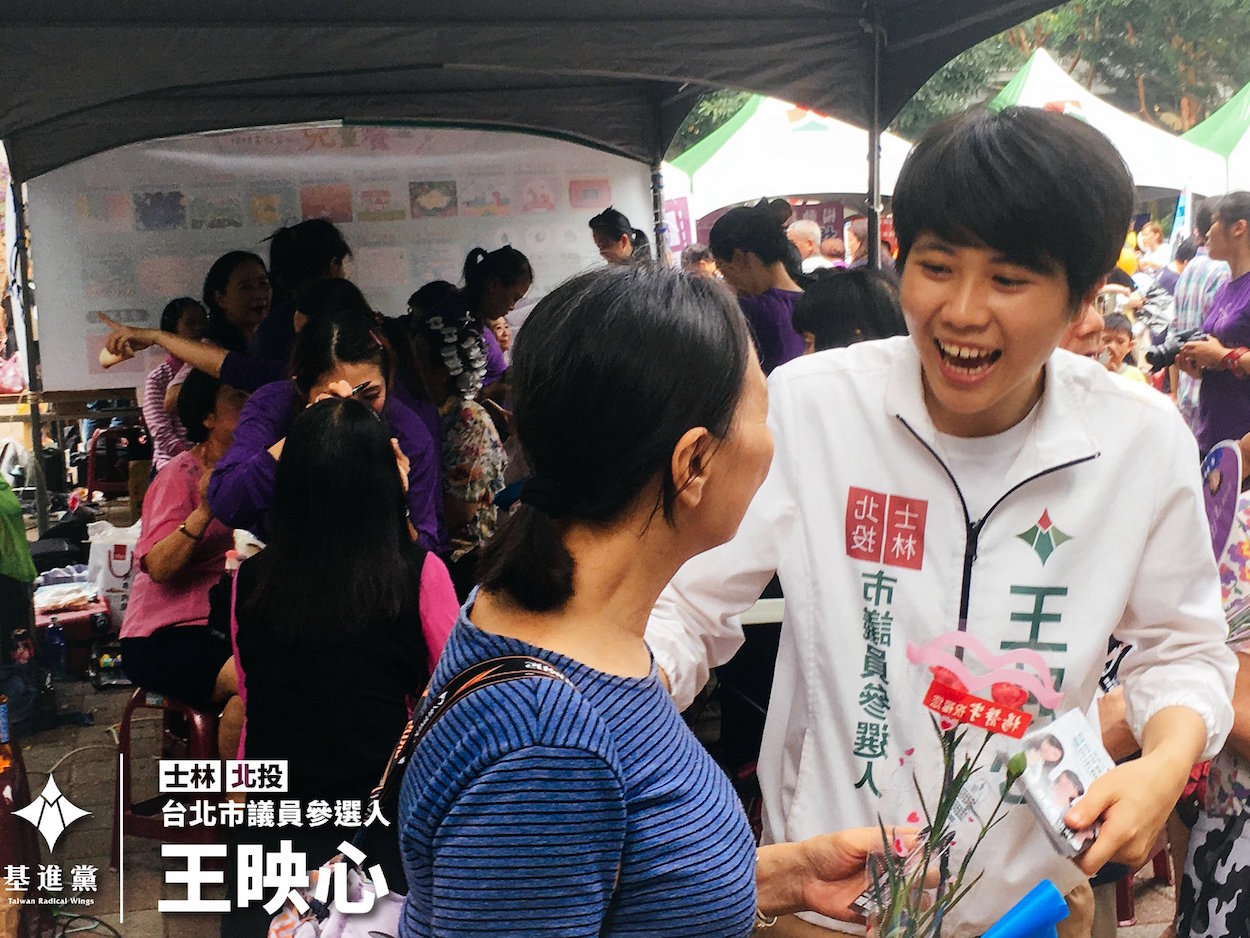 Photo credit: 映心地下放送局/Facebook
Photo credit: 映心地下放送局/Facebook
This represents that Taiwanese people’s sense of crisis is very low. Because when China wants to suppress us, they can redirect attention with just a word. This is why Taiwan has become their first target. With Taiwanese indifferent to continued Chinese oppression, this is very bad.
Which is to say that China, or perhaps the international world, feel that direct efforts at suppressing us are useful. You just need to scare Taiwan a bit. There won’t even be this need to feel like defending yourself. I believe this is quite serious. So you can see something like the Formosa Alliance’s rally last Saturday is important because it expresses the voice of Taiwanese identity, it can allow people to know that people do care about Chinese influence. This is why we, of the Radical Party, participated in it.
But whether through the Formosa Alliance’s demonstration, elections, or other forms of large-scale mobilization, we hope to everyone know that we are paying attention to international trends and that we need to follow these international trends to protect Taiwan’s future. Only then can there be the possibility for independence.
BH: What do you think is different about elections this time, as compared to two years ago? Because this time it is city council elections and Tsai Ing-wen has been office for two years.
WY: In other words, what do I think is different about elections this time? People are more indifferent to the present than before because legislative elections last time was right after the end of the Sunflower Movement, which led society to feel full of hope. They thought that something would change. But now people feel disappointed in politics. Why is it this way? We can point to a few points.
We can see that one aspect of this is through fake news, which has proven a means of China infiltrating Taiwan, as a means of controlling society. This is a core element of modern war. But the government hasn’t taken actions to prevent the spread of fake news. This is why after the DPP took office, you’ll often see the release of bad news about the DPP. This has influenced people to think that the present government isn’t doing anything and so they have become more and more disappointed with politics. This is not to say that one shouldn’t criticize the DPP, but there is a lot of fake news on the Internet without any basis in reality.
The second point is many young people came out after the Sunflower Movement, the so-called Sunflower generation. The people have high hopes for this so-called Sunflower generation as representatives of a new form of politics. But I have to say, there were two paths that clearly emerged during the Sunflower Movement. One was the path of opposing the black box. The other was the so-called path of opposing the CSSTA, which was also to oppose China. Because you can see that the CSSTA was a means for China to influence us.
As such, with the voice of the media stolen away and public opinion being influenced, in the end, it seems like the movement became about only opposing the Black Box, So would you let the CSSTA pass? In the end, it became like this.
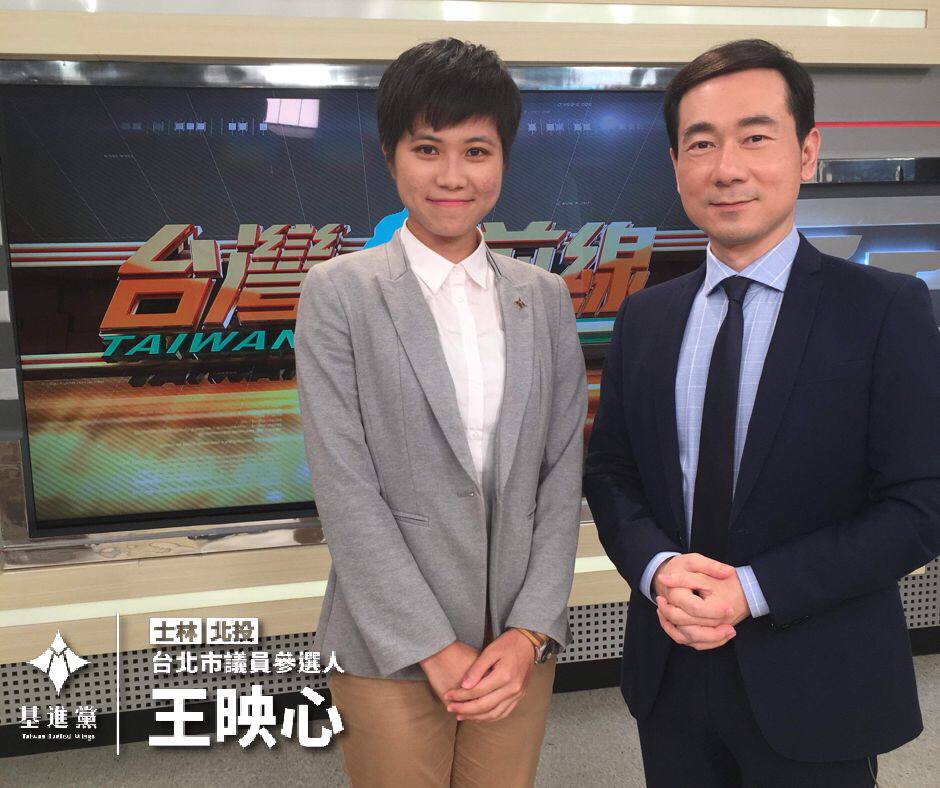 Photo credit: 映心地下放送局/Facebook
Photo credit: 映心地下放送局/Facebook
Opposing the Black Box is the path that the NPP picked. This has come to dominate the voice of the media as well. This group of people, after they formed the NPP, took away the resources of the movement, they took all of the resources of the movement as a whole. They formed a new political party and were smoothly able to enter the legislature.
But after taking seats in the legislature, they did not do what a Third Force should do, which is to act as a second local political party. What should a second local political party do? They should act to weaken the influence of the Chinese KMT, and to think of ways to remove the Chinese KMT from the Taiwanese political sphere. However, they haven’t done this, and they have no way to oppose China’s actions in Taiwan, to allow people to wae of this false information from China.
They should have taken on this responsibility. Because after the DPP won and occupies a majority, they now occupy the political center. So they can’t directly talk about opposing China and these kinds of ideals. It should be the second local political party which raises these issues. But they haven’t taken on this responsibility and have instead found ways to give the DPP trouble.
Okay, so you find ways to give the DPP trouble. That is also fine. But in the end, then with the laws you propose, they aren’t any different from those put forward by the DPP. You just add two lines. Compared to the DPP, this is not so different. Up to now in city council elections, despite the politics you profess, you try to stick to Ko Wen-je, and don’t defend your core values. How is this different than the DPP? Haven’t you just shirked the hopes placed on you? In simply hoping for you to have the most votes, everything voted for this kind of party.
So I believe these two things have led people to feel disappointed. But after these disappointments, it is hard for people to have more expectations, and their political attitudes have changed.
Given this situation, we need to let everyone know where the importance of voting for the Radical Party is. We want to oppose the control of our legislature by people with money, and we want to teach Chinese influence a lesson. We hope to become a second local party, one more local than the DPP, and for these two detachments to walk together, to allow for the further development of Taiwan’s democracy and to put the DPP on alert. We hope for everyone to know that this is where we are the most different than others, politically, and we hope to eventually become a new ruling party in the future.
Outside of what I said earlier regarding everyone’s disappointments, it is also because of the influence of this fake news, that the ruling party’s election chances do not look so good. People will start to feel this because they have become too disappointed in the Tsai administration. I believe we really need to oppose this influence of fake news.
 Photo credit: 映心地下放送局/Facebook
Photo credit: 映心地下放送局/Facebook
BH: Is there anything you would like to say in closing to readers? Not just Taiwanese readers, but also international readers.
WY: What I want to say for these friends from the international world is that the Taiwan you see today is not the real Taiwan, what you see is covered by the ROC and by a greater China framework, which has colonized Taiwan. So in terms of language or culture
This isn’t what we truly are. In the past, Taiwan has been lacking in making it clear to the international world that we are not the ROC and are different from China. We want the world to know we hope to be Taiwanese.
The reason why we have been lacking in this respect is that many people domestically also do not understand these differences regarding the ROC or China.
That is why this time, in running, the Radical Party hopes to stir political action, to use this opportunity to let people know that the ROC is not Taiwan. In the course of this, we hope to pursue justice and equality. If we are able to implement our ideals, we need to build our own nation. We cannot only be concerned with domestic issues and we need to unite, to condense our national identity, that we are Taiwanese, that we identify with Taiwan, and that we hope to accomplish things for Taiwan.
Towards the international world, we must say loudly that we are committed to this. What the international world calls Taiwan today is not what it appears to be. At the very least, we do not identify with this. As such, we hope to become ourselves, so that one day, people can understand the circumstances of Taiwan being colonized, and so people can see what Taiwan truly looks like.
BH: Thank you.

